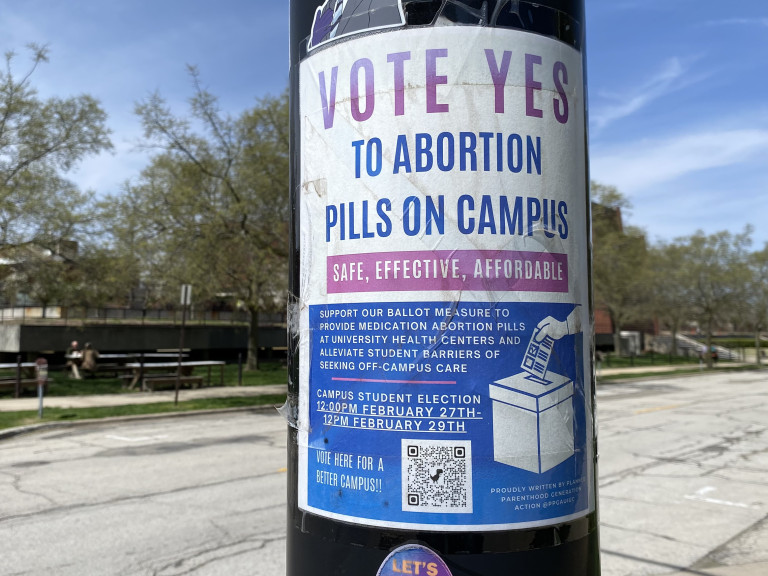UIUC will not provide on-campus access to abortion pills, despite overwhelming student support

Flyers posted around campus this spring encouraged students to support a referendum for on-campus access to abortion pills. Adelyn Mui/Illinois Student Newsroom
The director of the McKinley Student Health Center at the University of Illinois at Urbana-Champaign said the campus is not planning to provide on-campus access to abortion medications, despite overwhelming support from students.
Nearly three-quarters of the 6,354 students who participated in the Illinois Student Council election this February voted “Yes” when asked if they “support on-campus healthcare centers providing FDA-approved medication abortion pills to alleviate the barriers students frequently encounter when seeking pregnancy termination services,” according to the student election results, released by the Campus Student Election Commission. About 18% voted “No” and 7% did not answer.
The student health center, however, does not support the referendum.
“Unfortunately, currently, McKinley does not have the expertise in-house to provide abortion services,” said Awais Vaid, Executive Health Director at McKinley Health Center. “On our website, we have provided all the resources that are available.”
The resources Vaid mentioned include the Planned Parenthood Clinic in Champaign near the Urbana campus, and Equity Clinic, a clinic that provides abortion services, located a few miles away.
Vaid also emphasized that since McKinley does not bill for insurance, abortion pills would be an out-of-pocket cost, which could be a heavy financial burden to a student.
Planned Parenthood of Illinois did not say whether the group supports on-campus access to abortion or whether abortion accessibility is an issue for college students. But in response to questions sent via email, Jennifer Fetters, Champaign Health Center Manager of Planned Parenthood of Illinois, said PPIL “applauds all efforts to expand access to health care, including abortion care. Medication abortion pills should be treated like any other prescription, allowing more people to get the care they need in the way that works best for them.”
Fetters also shared that PPIL’s Champaign Health Center has seen an increase of over 800% in out-of-state abortion patients since Roe v. Wade was overturned in 2022 — with 50% of those patients coming from Indiana. And she described the news that Walgreens and CVS will start dispensing abortion pills in states where it's legal as a “win for health equity.”
Illinois Student Newsroom spoke with UIUC students to see what they thought about the on-campus abortion access initiative — and McKinley’s stance.
UIUC junior Diya Thomas said she voted “Yes” for the referendum, and after hearing McKinley’s viewpoint, still believes that the campus should provide abortion access.
“I'm sure there are local facilities as well, but it depends. What do you define as local?” she said. “I'm sure a lot of students don't have a car on campus, and having something offered at McKinley would just make it easier for people who don't have cars.”
UIUC senior Lilly Tito said she believes public universities should offer abortion services, but can also see McKinley’s perspective.
“I do see that there are other places [that offer abortion services] around campus, but I don't see that as a reason to not offer it,” on campus, Tito said. “I think there's so much funding that goes into the school, where if we just focused our priority on that, it could easily be done.”
Others who oppose abortion generally, like UIUC junior Matthew Le, were sympathetic to campus’ decision to not provide access to abortion pills on campus.
“We have a lot of access here already, and I agree with the statement of not making it more accessible,” he said.
In some states, college campuses are required by law to provide abortion services. In California, a law passed in 2019 required state colleges and universities to provide abortion pills on campus starting on Jan. 1, 2023. Massachusetts passed a law in 2022 requiring similar access on campus or through local resources nearby.
Vaid said if a similar law were to pass in Illinois, UIUC would take steps to comply.
“In the future, the governor can make a directive even in Illinois to have [abortion pills] available and at that point, we will have to reconsider how we work this out,” Vaid said.
He added that McKinley Health Center reached out to health center partners in Illinois, as well as some Big Ten colleagues across the country, and found that none provide on-campus abortion access.
“One thing which was a little bit of a disappointment for me is the student group that put this on the ballot – they should have had a conversation with us before they put this on the ballot, so that we could have had a conversation about what our limitations are, what our resources are and the fact that access is not an issue in our community,” Vaid said.
Illinois Student Newsroom conducted an interview with representatives of UIUC’s Planned Parenthood Generation Action student group, which wrote the referendum. The group revoked its comments ahead of publication.

